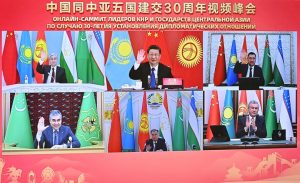Late next week, the presidents of Central Asia will travel to the city of Xi’an for a summit with Chinese President Xi Jinping. President Kassym-Jomart Tokayev of Kazakhstan, President Sadyr Japarov of Kyrgyzstan, President Emomali Rahmon of Tajikistan, President Serdar Berdimuhamedov of Turkmenistan and President Shavkat Mirziyoyev of Uzbekistan are all expected to attend the May 18-19 summit, at which Xi is set to deliver an “important speech” on China’s relations with the region.
During a regular press conference on May 8, Chinese Foreign Ministry Spokesperson Wang Wenbin provided details about the May 18-19 summit. Wang called the meeting the “first major diplomatic event that China hosts this year” and noted that it will be the first ever in-person summit between the leaders of the six countries. While the leaders of Central Asia are no strangers to China, often when Chinese presidents meet with their Central Asian counterparts, it is either individually or a Russian leader is also in the room — within the confines of the Shanghai Cooperation Organization (SCO), for example.
A number of countries, starting with Japan in the early 2000s and most prominently the United States, have taken to approaching Central Asia regionally. By gathering the five Central Asian presidents or foreign ministers together (without Russia), outside powers get more bang for their diplomatic buck. They often stress the region’s political independence, but in grouping the five countries together often conveniently avoid touchy bilateral issues or other sensitive matters.
In 2020, China launched its version of the 5+1 format with a virtual meeting. The most recent summit was a January 2022 online summit.
The Diplomat’s Umida Hashimova wrote in 2020 that the first China-Central Asia meeting marked a “smooth graduation from mainly economic relations with the region to more political relations.”
China in Central Asia has been a hot topic in geopolitical conversations since at least 2013, when Xi launched the overland portion of what we now call the Belt and Road Initiative (BRI) at a landmark speech in Astana. While mulling Beijing’s political and security aspirations in Central Asia certainly predates 2022, the Russian invasion of Ukraine has amplified the opportunities the region presents to China in Moscow’s weakening shadow.
Whether Russia’s losses are China’s gains is a critical question, influenced in a way by consideration of how Russia views the growing Chinese role and presence in the region. Russia and China have gone to great lengths to demonstrate a kind of solidarity with each other. In February 2022, before the Russian invasion of Ukraine, Xi and Russian President Vladimir Putin proclaimed that the friendship between the two states had “no limits.” But context matters: For the time being Russia and China, at the geopolitical level, stand together opposite the broadly-defined West (which includes a number of U.S. allies in Asia, too).
The timing of the China-Central Asia summit overlaps with the May 19-21 G-7 summit hosted by Japan in Hiroshima. In attendance will be the leaders of the Group of Seven, an intergovernmental political forum including Canada, France, Germany, Italy, Japan, the United Kingdom, and the United States (plus the EU as a “non-enumerated member.”) Japan has also invited as guess the leaders of Australia, Brazil, Comoros, the Cook Islands, India, Indonesia, South Korea, Ukraine, and Vietnam.
The G-7 was the G-8 until 2014, when Russia was expelled in the wake of its annexation of Crimea.
And so, while Xi is meeting with the leaders of Central Asia, the leaders of the ‘West” will be gathering. Both summits will proceed without Russia in attendance, but with Russia as a major topic of discussion.
During the May 8 press conference, Wang said Xi would deliver an “important speech” at the summit. He said that “the presidents will review the course of growth of China-Central Asia relations, exchange views on the development of mechanisms between the two sides, cooperation in all areas as well as major international and regional issues of mutual interest, and jointly sign an important political document.”
He concluded that the summit “will help draw a new blueprint for China-Central Asia relations and open up a new era for cooperation between the two sides.”
It is difficult to imagine “major international and regional issues of mutual interest” not including the Ukraine war and the regional economic, if not political, implications. We can expect public statements after the summit to be devoid of anything overtly critical of Russia, but the interests of China and Central Asia do not necessarily align with the prolongation of the war in Ukraine.
Critically, it’s not clear what the “important political document” Wang mentioned is. It could be as simple as a joint statement, but may very well be something more.
It’s worth a detour to the Pacific for some context: In May 2022, then-Chinese Foreign Minister Wang Yi met with 10 of his Pacific Island counterparts in hopes of walking away with consensus on a sweeping security and cooperation agreement. A draft was leaked, however, and Wang failed to secure the expected agreement. We know essentially nothing about the “important political document” China hopes to sign with the leaders of Central Asia, but it may tell us much about Beijing’s aims in the region.
The presidents of Kazakhstan, Kyrgyzstan, Tajikistan, and Uzbekistan will all also conduct state visits to China around the summit, some before and some after the main event. Turkmenistan’s Serdar Berdimuhamedov already made a state visit to China in the first week of 2023.
































